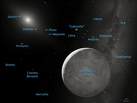(and I feel fine)....

Recently, the world's media have been waiting with bated breath, as the International Astronomical Union met in Prague to vote whether Pluto should still be considered the Ninth Planet.
Yesterday, they declared that Pluto was now considered a Dwarf Planet, with the other eight (including ours), being considered the 8 Classical Planets.
I was overjoyed at this decision, as I have begun to increasingly realise as an amateur astronomer, that Pluto doesn't deserve true planet status.
This morning I discover that other astromoners around the world were throwing fits screaming " you can't! It's a planet no it is really!" I HAVE BEEN INCENSED by their responses- my God, I thought, but these are scientists! How can they be so sentimental when the harsh facts show Pluto no longer deserves true planet status?
Let me make my argument. Now. Pluto is (was) the ninth planet, as were all taught in school. And it was true...it was the farthest known orbit in the Solar System, discovered by farm-boy Clyde Tombaugh in 1930.
Ahhhhh. Scientists and astromomers were soooo relieved to find this planet. Since the discovery of Neptune by William Hershel, astronomers were puzzled by Neptune's wonky orbit...it was askewed, as if being 'pulled' by something, distorting it's real orbit.
This new planet solved this problem- Pluto fitted the bill.
Relief. The Solar System was orderly again.
But, things started to go wrong... Pluto wasn't playing the game.
As technology became more sophisticated and viewing techniques improved, astronomers were starting to sweat. Things weren't right....
First, it's orbit. |Unlike the other 8 Classical Planets, who all orbit the Sun in a roughly round orbit, along the same plane, (as if all lying along an invisible thread when viewed sideways). It was found that Pluto was in a strange, very elongated orbit, so bizarrely different from the other 8 classical planets. It's orbit is so ellipical, that Pluto actually cuts in across Neptune's orbit, and for a while Neptune is the farthest planet from the Sun. It acts more like a far out comet.
Second. It's size. First presumed to be massive when discovered, Planet X's size has been corrected, re-corrected and corrected again to the point it has dwindled to not even being the size of Continental USA at only 1300 miles across.
But that's ok, astronomers said. It can still be considered a planet, because it's round (due to it's own gravity being able to contract into a sphere). AND it has a satallite! Ooh! And another!!
 Pluto being found to have satellites made some astronomers think it could avoid the axe...
Pluto being found to have satellites made some astronomers think it could avoid the axe...And the other learned reason it could still be considered a planet, they said, was because, errrm...we want it to be! Generations of kids have learnt it's the 9th planet! Don't hurt the kiddies!
But it wasn't enough. The one that really put the cat amongst the pigeons, though, was when Mike Brown found UB313 three years ago...Codename Xena, which was declared as possibly the 10th Planet.
It was even bigger than Pluto!
But by this time the opinion and observations of the Solar System had changed. Lots of debris had been discovered out near Pluto, similar to the asteroid Belt between Mars and Jupiter, all leftovers from the beginnings of our Solar System billions of years ago. But this area out by Pluto, the Kuiper Belt (after the astronomer who theorized it's existence long before we had the technology to find it) has lots and lots of Keiper Belt Objects-KBOs...some big, most small.
UB313, Xena, was found there (bigger than Pluto)
As was another planet-sized object (nicknamed Santa)
Oh dear.
Another (nicknamed Rudolph)
And Another (Quaoar)
Aaannd another (Sedna).
Pluto was no longer alone. It had company. Infact, some objects were bigger than itself. But astronomers would only call them KBOs, not real planets.
Which is where we come to, today.
Pluto has been sacked for the right reasons....it doesn't move along the Solar System's orbit plane, it has a comet-like, not planet-like, orbit round it's parent star, and is nestled in amongst other similarly found objects, found to be nothing more than the dusty outer-ring leftovers from the Solar System's birth.
So, what of the astronomers who want Pluto reinstating?
(Deep breath)
I'm sorry, but in my humble opinion, they are mixing science with sentimentality. There is no room for childhood nostalgia in science.
Science is supposed to deal with hard, cold clinical facts. It is supposed to be rational. It is meant to transcend the fool-hardiness that occurs when emotion becomes confused with logic. The recent romanticism in this area of astromomy has frankly, sent me mad, and I am amazed that hard-nosed academic astronomers, actually have the nerve to face the public and say, "but the kids don't want to lose it".
My response to that, is two-fold;
1) Ceres was once thought to be 'the missing planet' between Mars and Jupiter. It transpired that it is only a large object in what we now know as the Asteroid Belt, and it was demoted to minor planet.
How much sleep did people lose when Ceres was relegated? Not much, I 'd guess.
2) Don't mix sentimentality with scientific evidence and observation. Face the facts.
FIN.


No comments:
Post a Comment